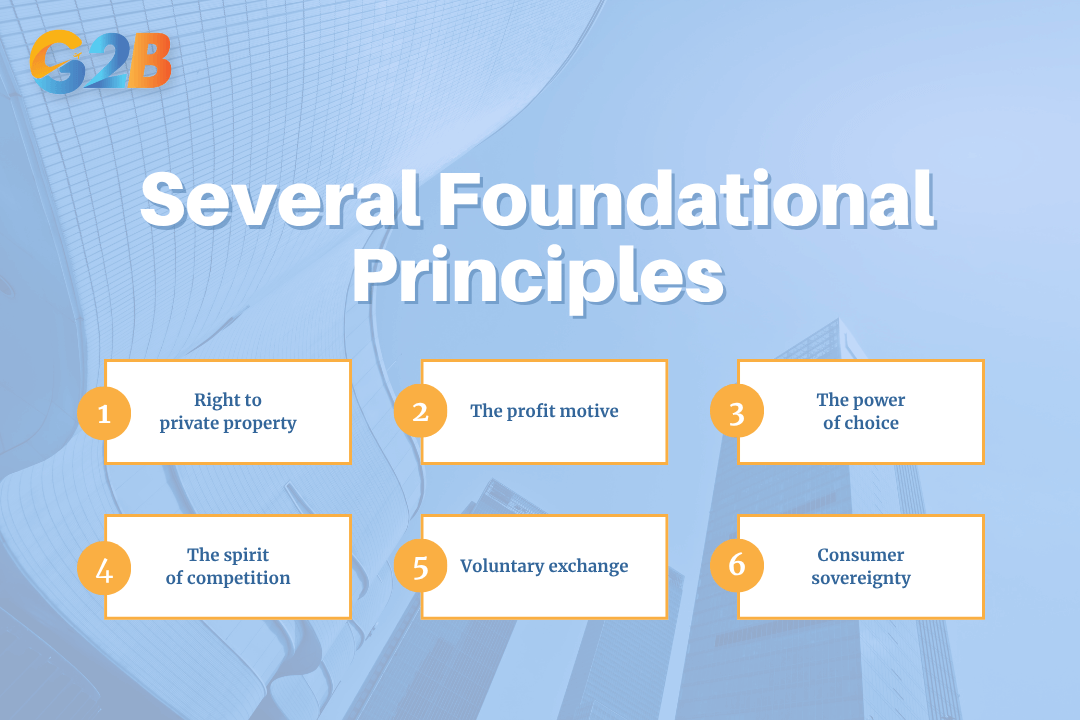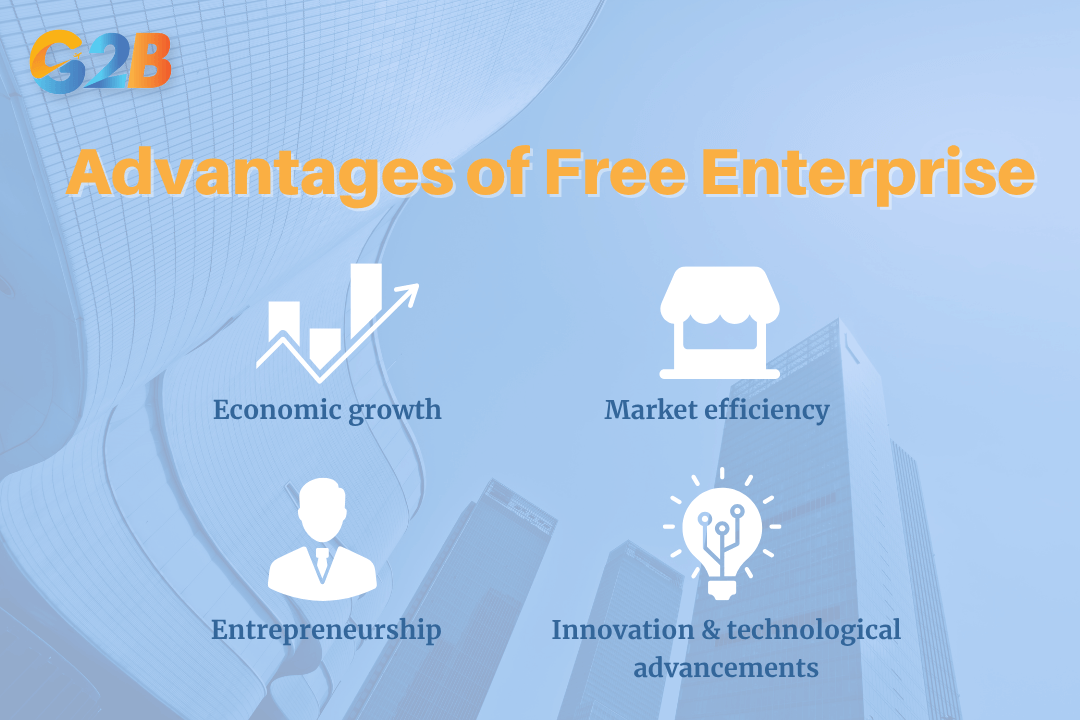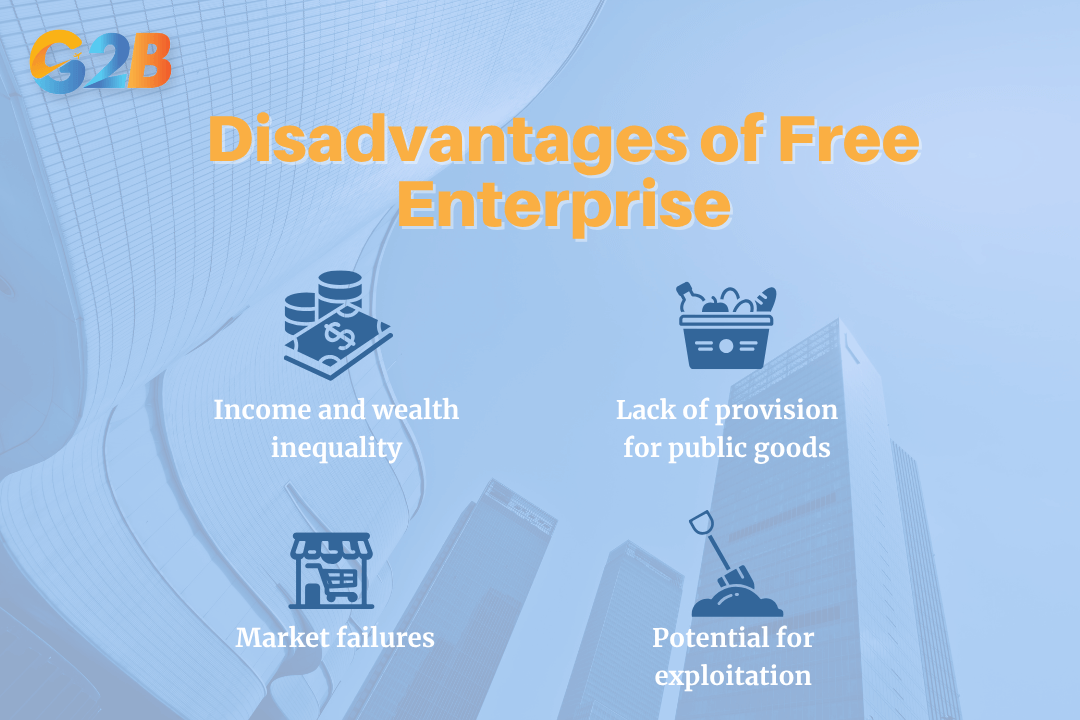Free Enterprise is an economic framework built on the principles of economic liberty and minimal government intervention. In this system, private businesses compete freely, and the forces of supply and demand are the primary drivers of the market, determining the prices of goods and services. This economic model empowers individuals and businesses to make their own financial decisions, thereby fostering an environment conducive to innovation and growth. This article will explore the core principles, goals, pillars, and the real-world advantages and disadvantages of Free Enterprise.
This article provides readers with a clearer understanding of Free Enterprise. We specialize in company formation and do not offer financial or investment advisory services. For detailed investment guidance, please consult a qualified financial expert.
What is a free enterprise?
A free enterprise system is an economic model where private businesses have the freedom to operate and compete with minimal government interference. It is often referred to as a free market economy, where the production and prices of goods and services are determined by the unrestricted competition between privately owned businesses. The core idea is that individuals and companies can pursue their economic interests, leading to innovation and growth that benefits society as a whole. Private ownership of property and the means of production is a fundamental pillar, allowing individuals to control resources and make independent economic decisions. Consumer choice also drives the market, as businesses respond to the demands and preferences of buyers.
Goals of free enterprise?
The fundamental objectives of a free enterprise system are centered around creating an environment that fosters economic prosperity and individual liberty. These goals are not merely theoretical; they have a direct impact on the opportunities available to individuals and the overall health of an economy. Here is a breakdown of the primary goals of a free enterprise system:
| Goal | Description |
|---|---|
| Economic Freedom | This is the cornerstone of the system. It encompasses the right of individuals to choose their occupations, start businesses, and make their own economic decisions without undue government coercion. Consumers are free to choose what to buy, and producers are free to determine what to sell and how to produce it. |
| Economic Opportunity | A primary goal is to provide a just system where everyone has the same economic rights and opportunities. This means creating an environment where anyone with a good idea and a willingness to work hard can start a business and succeed. |
| Market Efficiency | Free enterprise aims to achieve an efficient allocation of resources. In a competitive market, businesses are driven to produce goods and services at the lowest possible cost to maximize profits. This leads to greater productivity and a more efficient use of labor, capital, and natural resources. |
| Economic Growth | By encouraging innovation and investment, free enterprise seeks to foster sustained economic growth. The pursuit of profit incentivizes businesses to develop new products, technologies, and processes, which in turn creates jobs and increases the overall standard of living. |
| Consumer Choice | A key objective is to provide consumers with a wide variety of goods and services at competitive prices. Competition among businesses ensures that consumers have numerous options and that companies are responsive to their needs and preferences. |
| Financial Security and Stability | The system aims to protect the financial rights and assets of individuals. This includes safeguarding private property and ensuring that individuals can feel secure in their economic endeavors. By allowing consumers to shape the economy through their choices, the system can achieve a more predictable and stable economic environment compared to one directed by government policy. |
The pillars of a free enterprise?
A free enterprise system is supported by several foundational principles that ensure its proper functioning and contribute to its dynamism. These pillars work in concert to create an economic environment that encourages innovation, efficiency, and individual prosperity.

A free enterprise system is supported by several foundational principles
The right to private property
The right to private property is a cornerstone of the free enterprise system, allowing individuals and businesses to own, control, and benefit from their assets. This includes tangible assets like land and buildings, as well as intangible assets such as intellectual property and copyrights. The U.S. Constitution, particularly the Fifth Amendment, provides a legal basis for this right, stating that private property cannot be taken for public use without just compensation. This right provides a powerful incentive for individuals and businesses to invest, take risks, and innovate. When people know that they will be able to enjoy the fruits of their labor and investments, they are more likely to use their resources productively, which in turn fuels economic growth.
The power of choice
Economic freedom of choice is a fundamental pillar that empowers both consumers and producers. Consumers have the liberty to decide which goods and services to purchase, and businesses have the freedom to determine what to produce and how to operate. This dual freedom is what drives the dynamics of the market. For this pillar to be effective, there must be a competitive marketplace. When multiple businesses are vying for customers, consumers benefit from a wider variety of goods and services at more competitive prices. This power of choice ensures that the market is responsive to the needs and desires of the population.
The profit motive
The profit motive is the primary driver of economic activity and innovation in a free enterprise system. It is the incentive that encourages entrepreneurs to take risks, invest their capital, and create new businesses. The potential to earn a profit motivates businesses to operate efficiently, reduce costs, and develop new products and services that meet consumer demands. Profit is essentially the reward for successfully identifying and satisfying a market need. This pursuit of profit not only benefits the business owner but also leads to job creation, technological advancements, and overall economic prosperity.
The spirit of competition
Competition is the regulatory mechanism of the free market, benefiting consumers and the economy as a whole. When businesses compete with one another, they are compelled to offer lower prices, higher quality goods, and better services to attract customers. This competitive pressure fosters innovation as companies continuously seek new ways to gain an edge over their rivals. A competitive environment also helps to prevent the formation of monopolies, where a single company can dominate a market and dictate prices. In a healthy, competitive market, the consumer holds the ultimate power.
Voluntary exchange
Voluntary exchange is the foundation of all market transactions in a free enterprise system. It is the principle that a transaction occurs only when both the buyer and the seller believe they will benefit from it. This means that all exchanges are mutually beneficial, and no one is forced to enter into a transaction against their will. This principle is built on the foundation of private property rights, as individuals must have ownership of a good or service to be able to exchange it. The role of the government in this context is limited to enforcing contracts and ensuring that transactions are conducted fairly.
Consumer sovereignty
Consumer sovereignty is the principle that consumer purchasing decisions ultimately direct the allocation of resources in the economy. In a free market, consumers "vote" with their dollars every time they make a purchase. These "votes" send signals to producers about what goods and services are in demand. This power forces businesses to be responsive to consumer preferences and to innovate in order to survive and thrive. Companies that successfully meet the demands of consumers are rewarded with profits, while those that fail to do so will eventually cease to exist.
Advantages and disadvantages of free enterprise
While the free enterprise system is a powerful engine for economic growth and innovation, it is not without its challenges. A balanced understanding of both its positive and negative aspects is essential for a comprehensive view of this economic model.
Advantages of free enterprise
- Economic growth: Free enterprise systems have historically demonstrated higher rates of economic growth. The competitive environment encourages companies to expand, leading to more job creation and increased wealth for the nation's citizens.
- Market efficiency: The profit motive and competition drive businesses to use resources efficiently, minimizing waste and maximizing output. This leads to a more productive economy where goods and services are produced at the lowest possible cost.
- Innovation and technological advancements: The constant pressure to compete pushes businesses to innovate and develop new products, services, and technologies. This drive for innovation leads to progress that benefits society as a whole.
- Entrepreneurship: The system provides a fertile ground for entrepreneurship, allowing individuals with innovative ideas to start businesses and pursue their economic ambitions. This fosters a culture of self-reliance and creativity.

The free enterprise system is a powerful engine for economic growth and innovation
Disadvantages of free enterprise
- Income and wealth inequality: One of the most significant criticisms of free enterprise is its potential to lead to substantial disparities in income and wealth. Those who own capital and successful businesses may accumulate wealth at a much faster rate than laborers, creating a wide gap between the rich and the poor.
- Market failures: Free markets are susceptible to market failures, where the pursuit of individual self-interest leads to inefficient outcomes for society. Examples of market failures include:
- Monopolies: A lack of competition can lead to the formation of monopolies or oligopolies, where a few firms control the market and can charge excessive prices.
- Negative externalities: These are costs imposed on third parties that are not involved in a transaction. A common example is pollution from a factory, which can harm the environment and public health without being factored into the cost of the product.
- Public goods: Some goods and services, such as national defense or public parks, are not profitable for private companies to produce because it is difficult to exclude non-payers from using them. This can lead to an underproduction of these essential services.
- Potential for exploitation: In a purely free market, the profit motive can sometimes lead to the exploitation of workers or consumers if not properly regulated. This can manifest in unsafe working conditions, low wages, or deceptive marketing practices.
- Lack of provision for public goods: Goods that are not profitable to produce, such as infrastructure in rural areas or certain public services, may not be provided by the private sector alone. This often necessitates some level of government intervention to ensure these needs are met.

There are several disadvantages of free enterprise
The free enterprise system stands as a powerful testament to the potential of economic freedom. It is a framework that unleashes individual ambition and creativity, driving innovation, efficiency, and economic growth. The core principles of private property, consumer choice, the profit motive, and robust competition create a dynamic environment where businesses are constantly striving to better meet the needs of the public. For investors and entrepreneurs planning to register a company in Vietnam, these principles form the very foundation of a thriving and competitive market economy. This not only leads to a vast array of goods and services but also fosters a resilient and adaptable economy.
However, it is equally important to acknowledge that this system is not without its inherent challenges. The potential for significant income inequality, the risk of market failures like monopolies and negative externalities, and the underprovision of public goods are serious concerns that require thoughtful consideration. A successful implementation of free enterprise often involves a carefully calibrated role for government - one that protects property rights, enforces contracts, and addresses market failures without stifling the entrepreneurial spirit that is the system's lifeblood.


 Delaware (USA)
Delaware (USA)  Vietnam
Vietnam  Singapore
Singapore  Hong Kong
Hong Kong  United Kingdom
United Kingdom 
